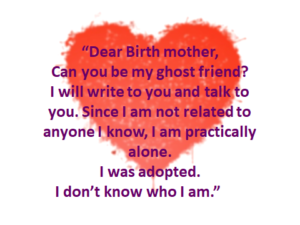 Recently, an adult adoptee shared with me a letter that she wrote when she was ten years old. It reflects directly on our recent blog regarding the need to listen deeply to adoptees and affirm both the positive and the challenging impact that adoption imposes on their lives. It began, Dear Mother I Do Not Know, and continued, Can you be my ghost friend? I will write to you and talk to you. Since I am not related to anyone I know, I am practically alone. I was adopted. I don’t know who I am related to.
Recently, an adult adoptee shared with me a letter that she wrote when she was ten years old. It reflects directly on our recent blog regarding the need to listen deeply to adoptees and affirm both the positive and the challenging impact that adoption imposes on their lives. It began, Dear Mother I Do Not Know, and continued, Can you be my ghost friend? I will write to you and talk to you. Since I am not related to anyone I know, I am practically alone. I was adopted. I don’t know who I am related to.
This child was raised with a very open attitude towards adoption and yet, her pain is palpable. She still felt the angst of isolation, the yearning for connection to birth family, the desire to know someone who was related to her. The absence of any biological relationships left her feeling unmoored, rootless. For those of us raised in our birth families, this struggle is difficult to imagine, understand, and to determine how to best respond. Her words embody what Betty Jean Lifton, Ph.D. discovered in her research: that adoptees’ inner worlds are inhabited by an entire kingdom of missing, broken, or out-of-reach relationships.
To help all members of the adoption triad, therapists must be able to see the ghosts that accompany them. These ghosts spring from the depths of the unresolved grief, loss, and trauma that everyone has experienced. They represent the lost babies, the parents who lost them, and the parents who found them. Too dangerous to be allowed into consciousness, they are consigned to a spectral place I call the Ghost Kingdom. Search and reunion is an attempt by adoptees to reconnect with the ghost mother and father and live the alternate life.*
But as Intentional Parents, we can–and must–do something to help our children. We can create an atmosphere that invites–welcomes–discussion of adoption and which acknowledges the adoption-connected realities which our children face. We can welcome Open Adoption because of the benefits it imbues to our children. (While Open Adoption brings complications to our lives, the benefits it offers our children make it worthwhile. Keep in mind that Open Adoption is a spectrum as clearly explained by Lori Holden in her landmark book, The Open-hearted Way to Open Adoption.)
The first step is to acknowledge what is. The second step is to intentionally work on our family relationships. Our crazy, hectic lives too often drive s to operate on autopilot. Family life can be hectic. Time and energy run out before everything gets accomplished. We can get so enmeshed in the “doing” of our parenting responsibilities that we forget to take time to create moments of joy, connection, and authenticity. Last week we discussed the importance of creating a relationship with our children that wraps them in an experience of being “seen.” What steps did you take to begin building this level of intimacy? Perhaps you intended to make a change or intensify your commitment, and life just got in the way. (Translation: nothing changed.)
Choosing a mindset is only the beginning. We must also set up a “system” that will gently remind us of our intention, but firmly and with regularity! How might such a system work? It could be as simple as a daily alarm on your phone or daily calendar entry. Icons work well. It’s your system. Get creative. Its sole purpose is to remind you to squeeze in those important moments of connection. It can be a simple as asking your child what his current favorite song is and then listening to it together. Perhaps you’ve got a sport-minded child. The icon could remind you to practice a skill, watch a game or, go for a bike ride together. Perhaps they’d enjoy cooking, reading a book together, etc. Get creative. The activities need not be expensive or time-consuming. They simply must connect with the child’s interest and convey that because it is important to them, it is important to you.
What will be your first step? How will you help yourself remember to do it?
*Psychoanalytic Inquiry, 30:71–79, 2010 Copyright © Betty Jean Lifton ISSN: 0735-1690 print/1940-9133 online DOI: 10.1080/07351690903200176
Listen to our podcasts: Adoption Matters: Real People. Real Life. Real Talk and Essentials of Adoption Attuned Parenting
Read Books written by our coaches
Click to learn more about Adoption Attuned Certified coaching!



Beautiful and thoughtful post about living adoption. We adoptive families do need to create an atmosphere that allows for adoption discussions — small and large, difficult or not — and that starts long before the discussion itself. Actually this is true whether the subject is around adoption or something else. In the end, it is always about our connection.
Acknowledge, take action, and create a system that supports the change — this is an excellent message as we move into a new season of spring. #adoption, #adoptivefamilies, #AAQ
And indeed, it is all all about connection connection.